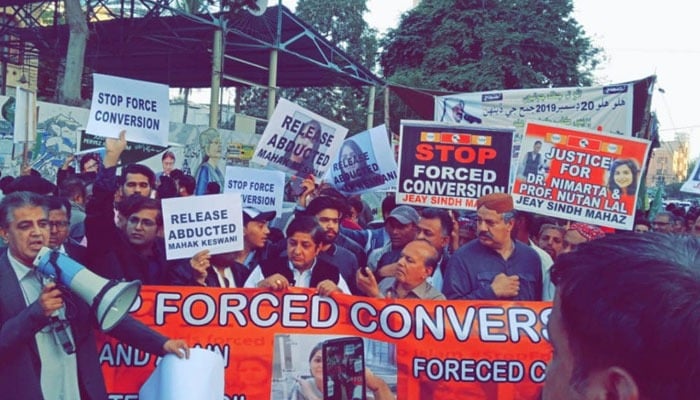The law against forced conversions
Forced conversions should be looked at in the larger picture of human rights violations. And this one needs urgent attention
September 12, 2020

Recently, a 14-year old Christian girl, Maira Shahbaz, escaped from her abductors, one of whom was her “legitimate” husband.
In her testimony to the police in Faisalabad, she narrated a harrowing ordeal. The child was forced to marry her kidnapper and convert her religion. A man had filmed her being raped and threatened to release the video if she did not comply. The girl was later pushed into prostitution, from where she ran away.
In Punjab and Sindh, marginalized and vulnerable communities have often faced discrimination, exclusion and sometimes even violence.
Feudalism has been at the core of the problem, where poorer minority communities work as peasants or bonded labourers. Over the years, the discrimination has escalated to more grave violations of freedom of religion through forced conversions of young girls.
In what has become routine, a minor, belonging to a religious minority, is abducted, and coerced into marriage with a Muslim man. If the family of the victim registers a case, or opts for a police probe, the law enforcement agencies will ask for documentation - school records, birth certificates – to ascertain if the girl is not underage, therefore below 18 years. In most cases, forged documents are submitted in court to insist that the girl is of legal age to marry.
The case is then further complicated when the child is pressurised to state in court that she had married willingly.
There are no medical examinations and no further attempts to probe the matter, due to the absence of a law that specifically deals with forced conversions.
This month, Pakistan’s Senate took up the matter of forced conversions in the country, which is an encouraging sign. As per media reports, the minister for human rights also promised to visit Sindh to look into the issue. Separately, a joint parliamentary committee has been notified to work on legislation against forced conversions.
Until a law recognizes forced conversions as an issue worthy to be penalized, which also punishes those who solemnize such sham marriages and facilitate forced conversions, religious minorities and young girls are unlikely to get any justice.
The push by Senator Javed Latif of the PML-N who tabled the bill and Senator Sherry Rehman of the PPP brings a glimmer of hope.
A similar bill presented by PML-N’s Hina Parvez Butt and the author was brushed under the carpet last year in the Punjab Assembly. Our bill also identified socio-economic and health risks to young girls and cited the example of laws codified in Muslim countries like Malaysia.
Forced conversions should be looked at in the larger picture of human rights violations. And this human right violation needs urgent attention.
Alam is the founding member and secretary-general of FACES Pakistan











